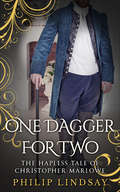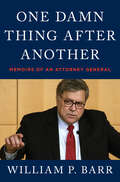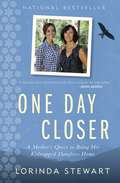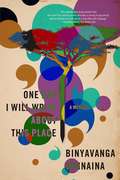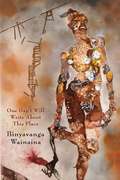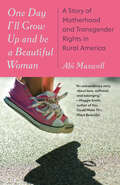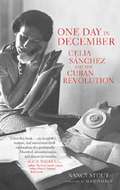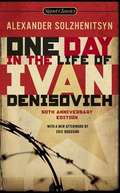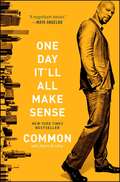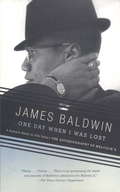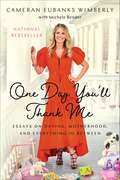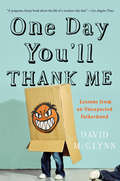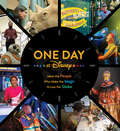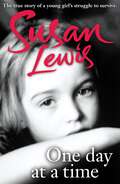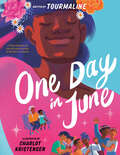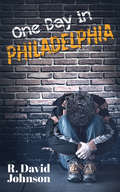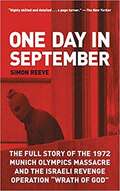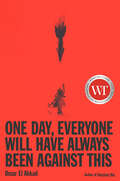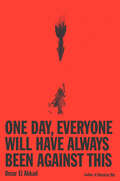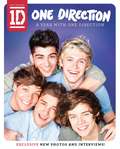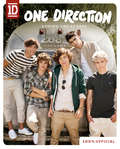- Table View
- List View
One Dagger For Two: The Hapless Tale of Christopher Marlowe
by Philip LindsayIn sixteenth-century London, a playwright with a taste for wine and women is seduced into danger . . . Queen Elizabeth sits on the English throne and plague ravages the streets of the nation’s capital. Against this backdrop, poet and playwright Christopher Marlowe struggles to complete his new play, Edward II—repeatedly succumbing to the more enjoyable distractions of drinking and gambling and not entirely trustworthy companions. But London’s pleasures are not all that capture his attention. Though he fancies himself in love with the wife of his patron, Thomas Walsingham, a chance encounter with a mysterious woman propels his life down a different path—one that will ultimately lead to his end . . .
One Damn Thing After Another: Memoirs of an Attorney General
by William P. BarrThe former attorney general provides a candid account of his historic tenures serving two vastly different presidents, George H.W. Bush and Donald J. Trump. <p><p>William Barr’s first tenure as attorney general under President George H.W. Bush was largely the result of chance, while his second tenure under President Donald Trump a deliberate and difficult choice. In this candid memoir, Barr takes readers behind the scenes during seminal moments of the 1990s, from the LA riots to Pan Am 103 and Iran Contra. Thirty years later, Barr faced an unrelenting barrage of issues, such as Russiagate, the COVID outbreak, civil unrest, the impeachments, and the 2020 election fallout. One Damn Thing After Another is vivid, forthright, and essential not only to understanding the Bush and Trump legacies, but also how both men viewed power and justice at critical junctures of their presidencies. <p> <b>New York Times Bestseller</b>
One Day Closer: A Mother's Quest to Bring Her Kidnapped Daughter Home
by Lorinda StewartOn the day my daughter Amanda Lindhout was kidnapped in Somalia, my life changed forever. This is the story of how, for 460 days, I fought to save her and bring her home. “This book is impossible to put down. As inspiring as it is bone-chilling, this is an incredible story of hope and joy, grit and gumption by a determined mother who will stop at nothing to save her daughter.” —Jann Arden, singer-songwriter and bestselling author of Falling Backwards “A gripping, mother’s-eye view of Amanda Lindhout’s kidnapping ordeal...For any parent who has ever worried about, advocated for, and deeply loved a child, Lorinda Stewart’s honest, lion-hearted account will leave you both stunned and uplifted.” —Sara Corbett, coauthor of A House in the SkyOn August 23, 2008, Amanda Lindhout was kidnapped outside Mogadishu in Somalia. The kidnappers’ demand was simple: pay millions or Amanda would be killed. For the next 460 days, Amanda’s mother, Lorinda Stewart, did everything in her power to get her daughter back alive. A brave, small-town mother with no experience in hostage negotiations, Lorinda was called upon by the Royal Canadian Mounted Police to be the lead communicator with “Adam”—the Somali man who identified himself as the English-speaking negotiator for Amanda’s kidnappers. In a secret “war room” in Sylvan Lake, Alberta, Lorinda joined forces with federal officers and began answering calls from Adam, establishing a fragile rapport of trust with the man who held her daughter’s fate in his hands. She learned how to demand POLs (proofs of life) from Amanda’s hostage takers and even how to react to “bad calls”—getting through them despite having to listen to her daughter’s desperate cries for help and fearing Amanda was being abused and tortured. What was supposed to be a short negotiation stretched on, and weeks became months. As negotiations broke down, Lorinda found herself increasingly on her own. But she never gave up hope, even when the phone calls became more traumatic. Faced with the terrible possibility of her daughter’s death, Lorinda decided to bring in private hostage negotiators and raise money from donors to support the cause of bringing Amanda home. But would it be enough? One Day Closer is the true story of one mother’s heroic perseverance in the face of despair, and of the hope and healing to be found beyond trauma. It is also, above all, a tribute to the extraordinary power of a mother’s love.
One Day I Will Write About This Place: A Memoir
by Binyavanga WainainaBinyavanga Wainaina tumbled through his middle-class Kenyan childhood out of kilter with the world around him.This world came to him as a chaos of loud and colourful sounds: the hair dryers at his mother's beauty parlour, black mamba bicycle bells, mechanics in Nairobi, the music of Michael Jackson - all punctuated by the infectious laughter of his brother and sister. He could fall in with their patterns, but it would take him a while to carve out his own. <p><p> In this vivid and compelling debut, Wainaina takes us through his school days, his failed attempt to study in South Africa, a moving family reunion in Uganda, and his travels around Kenya.The landscape in front of him always claims his main attention, but he also evokes the shifting political scene that unsettles his views on family, tribe, and nationhood. Throughout, reading is his refuge and his solace. And when, in 2002, a writing prize comes through, the door is opened for him to pursue the career that perhaps had been beckoning all along. Resolutely avoiding stereotype and cliche, Wainaina paints every scene in One Day I Will Write About This Place with a highly distinctive and hugely memorable brush.
One Day I Will Write About This Place: A Memoir
by Binyavanga Wainaina*A New York Times Notable Book**A New York Times Book Review Editors' Choice**A Publishers Weekly Top Ten Book of the Year*Binyavanga Wainaina tumbled through his middle-class Kenyan childhood out of kilter with the world around him. This world came to him as a chaos of loud and colorful sounds: the hair dryers at his mother's beauty parlor, black mamba bicycle bells, mechanics in Nairobi, the music of Michael Jackson—all punctuated by the infectious laughter of his brother and sister, Jimmy and Ciru. He could fall in with their patterns, but it would take him a while to carve out his own. In this vivid and compelling debut memoir, Wainaina takes us through his school days, his mother's religious period, his failed attempt to study in South Africa as a computer programmer, a moving family reunion in Uganda, and his travels around Kenya. The landscape in front of him always claims his main attention, but he also evokes the shifting political scene that unsettles his views on family, tribe, and nationhood. Throughout, reading is his refuge and his solace. And when, in 2002, a writing prize comes through, the door is opened for him to pursue the career that perhaps had been beckoning all along. A series of fascinating international reporting assignments follow. Finally he circles back to a Kenya in the throes of postelection violence and finds he is not the only one questioning the old certainties. Resolutely avoiding stereotype and cliché, Wainaina paints every scene in One Day I Will Write About This Place with a highly distinctive and hugely memorable brush.
One Day I'll Grow Up and Be a Beautiful Woman: A Mother's Story
by Abi MaxwellA fiery, heartbreaking, riveting memoir that follows one New Hampshire family over the course of three years, unspooling a story of gender identity, class, trans youth, and a child caught in the riptide of America&’s culture wars Abi Maxwell grew up in rural New Hampshire, one of eight kids in a poor town abutting a wealthier lakeside village. As a young couple, Maxwell and her husband planned not to have kids, but when Maxwell became pregnant, she knew she wanted to raise her child near the mountains and lake of her youth. When her six-year-old, who was known to the world as a boy, asks to wear pink sneakers, asks to be a witch for Halloween, asks to wear a girl&’s dance costume, Abi worries about how their small community will react. But when that child changes her name, grows her hair long, and announces that she is a girl, a firestorm engulfs the family. Weaving together the story of her own youth, marked by long afternoons skiing the mountains, a cottage on the lake, and a proud gay brother, but also by neglect and bullying that pushed her brother to the brink, Abi Maxwell contends with the rural America where she was raised and, years later, where she is now raising her daughter, as lawmakers nationwide push to erase the very existence of trans youth. Intimate and stirring, this book is essential reading for this moment in our history.
One Day In December: Celia Sánchez And The Cuban Revolution
by Alice Walker Nancy StoutCelia Sánchez is the missing actor of the Cuban Revolution. Although not as well known in the English-speaking world as Fidel Castro and Che Guevara, Sánchez played a pivotal role in launching the revolution and administering the revolutionary state. She joined the clandestine 26th of July Movement and went on to choose the landing site of the Granma and fight with the rebels in the Sierra Maestra. She collected the documents that would form the official archives of the revolution, and, after its victory, launched numerous projects that enriched the lives of many Cubans, from parks to literacy programs to helping develop the Cohiba cigar brand. All the while, she maintained a close relationship with Fidel Castro that lasted until her death in 1980. <p><p> The product of ten years of original research, this biography draws on interviews with Sánchez’s friends, family, and comrades in the rebel army, along with countless letters and documents. Biographer Nancy Stout was initially barred from the official archives, but, in a remarkable twist, was granted access by Fidel Castro himself, impressed as he was with Stout’s project and aware that Sánchez deserved a worthy biography. This is the extraordinary story of an extraordinary woman who exemplified the very best values of the Cuban Revolution: selfless dedication to the people, courage in the face of grave danger, and the desire to transform society.
One Day In The Life Of Ivan Denisovich
by Yevgeny Yevtushenko Aleksandr Solzhenitsyn Eric Bogosian<P>The first published novel of controversial Nobel Prize winning Russian author Alexander Solzhenitsyn. <P> In the madness of World War II, a dutiful Russian soldier is wrongfully convicted of treason and sentenced to ten years in a Siberian labor camp. <P>So begins this masterpiece of modern Russian fiction, a harrowing account of a man who has conceded to all things evil with dignity and strength. <P>First published in 1962, One Day in the Life of Ivan Denisovich is considered one of the most significant works ever to emerge from Soviet Russia. <P> Illuminating a dark chapter in Russian history, it is at once a graphic picture of work camp life and a moving tribute to man's will to prevail over relentless dehumanization. <P>Includes an Introduction by Yevgeny Yevtushenko and an Afterword by Eric Bogosian
One Day It'll All Make Sense
by Adam Bradley CommonFrom the hip hop icon, Hollywood star, and "a true artist and writer of deep talent" (James McBride, author of The Color of Water)--a candid, New York Times bestselling memoir ranging from his childhood on Chicago's South side and his emergence as one of rap's biggest names.Common has earned a reputation in the hip-hop world as a conscious artist by embracing themes of love and struggle in his songs. His journey toward understanding is rooted in his relationship with a remarkable woman, his mother. Common holds nothing back in this gripping memoir, both provocative and funny. He tells what it was like for a boy with big dreams growing up on the South Side of Chicago. He reveals how he almost quit rapping after his first album sold only two thousand copies. He recounts his rise to stardom and talks about the challenges of balancing fame, love, and family. Through it all, Common emerges as a man in full. Rapper. Actor. Activist. But also father, son, and friend. His story offers a living example of how, no matter what you've gone through, one day it'll all make sense.
One Day It'll All Make Sense
by Adam Bradley CommonCommon has earned a reputation in the hip hop world as a conscious artist by embracing themes of love and struggle in his songs, and by sharing his own search for knowledge with his listeners. His journey toward understanding--expressed in his music and now in his roles in film and television--is rooted in his relationship with a remarkable woman, his mother, Mahalia Ann Hines.In One Day It'll All Make Sense, Common holds nothing back. He tells what it was like for a boy with big dreams growing up on the South Side of Chicago. He reveals how he almost quit rapping after his first album, Can I Borrow a Dollar?, sold only two thousand copies. He recounts his rise to stardom, giving a behind-the-scenes look into the recording studios, concerts, movie sets, and after-parties of a hip-hop celebrity and movie star. He reflects on his controversial invitation to perform at the White House, a story that grabbed international headlines. And he talks about the challenges of balancing fame, love, and fatherhood. One Day It'll All Make Sense is a gripping memoir, both provocative and funny. Common shares never-before-told stories about his encounters with everyone from Tupac to Biggie, Ice Cube to Lauryn Hill, Barack Obama to Nelson Mandela. Drawing upon his own lyrics for inspiration, he invites the reader to go behind the spotlight to see him as he really is--not just as Common but as Lonnie Rashid Lynn. Each chapter begins with a letter from Common addressed to an important person in his life--from his daughter to his close friend and collaborator Kanye West, from his former love Erykah Badu to you, the reader. Through it all, Common emerges as a man in full. Rapper. Actor. Activist. But also father, son, and friend. Common's story offers a living example of how, no matter what you've gone through, one day it'll all make sense.ng example of how One Day -no matter what you've gone through--It'll All Make Sense.Rashid Lynn, aka, Common, a film and television actor and award-winning music artist, lives in Los Angeles. An independent publisher/author of books for children, including The Mirror and Me and I Like You but I Love Me, this is his first book for adults.
One Day Longer
by Lynn R. WilliamsLynn Williams remains one of the most influential North American union leaders of the twentieth century. His two terms as president of the United Steelworkers of America, from 1983 until 1994, capped off a career in labour relations spanning nearly five decades. Among his many notable achievements were the new bargaining techniques he developed to face challenges from anti-union politicians such as Ronald Reagan and Margaret Thatcher. Williams also played a major role in the structural readjustment of the North American steel industry during its most turbulent period, the 1980s and 1990s.In his memoirs, Williams vividly recounts his life in labour, with all its triumphs, challenges, hopes, and dreams. While telling his own story, Williams also traces the rise and transformation of the labour movement from the Second World War to today. Providing an insider's perspective on union developments and issues, One Day Longer is a profound reflection of Williams's impressive career.
One Day When I Was Lost
by James BaldwinBased on Alex Haley's bestselling classic The Autobiography of Malcolm X, a rare, lucidly composed screenplay from one of America's great masters of letters.Son of a Baptist minister; New York City hustler; honor student; convicted criminal; powerful minister in the Nation of Islam; father and husband: Malcolm X transformed himself, time and again, in order to become one of the most feared, loved, and undeniably charismatic leaders of twentieth-century America. No one better represents the tumultuous times of his generation, and there is no one better to capture him and his milieu than James Baldwin. With spare, elegant, yet forceful dialogue and fresh, precise camera directions, Baldwin breathes cinematic life into this controversial and important figure, offering a new look at a man who changed himself in order to change the country.
One Day You'll Thank Me: Essays on Dating, Motherhood, and Everything In Between
by Cameran Eubanks WimberlyThe fan favorite alumna of the Bravo hit series Southern Charm offers a witty and candid collection of essays on dating, pregnancy, and parenthood.Growing up in South Carolina with a family that goes back ten generations, Cameran Eubanks knew from a young age that Southern women are expected to want the white picket fence life. But Cameran has never been your typical Southern belle, and she was always determined to flout expectations. She set out to paint the town red, enjoy her single life, focus on her successful real estate career, maybe join the cast of a hugely popular reality show…and then she met her future husband, Jason. After falling in love and getting married, Cameran faced the same dilemma so many women encounter: whether or not to have kids. Ultimately, her own journey to motherhood was anything but simple. Now, she takes you deeper into her life—from her first foray into reality TV on The Real World to dating in her twenties to the honest truth about her pregnancy and motherhood—to get to know the person behind the camera. Known as the voice of reason on Southern Charm, she&’ll share the same honest advice she gives to her castmates and guide y&’all through dating, pregnancy, and motherhood. Charming, hilarious, and a hell of a lot fun, One Day You&’ll Thank Me is for anyone who has ever wondered if they should or can.
One Day You'll Thank Me: Lessons from an Unexpected Fatherhood
by David McGlynn“McGlynn’s trek through young parenthood—missteps, brawls, avalanches, and all—is as entertaining and shrewd as any book I’ve read in some time.” —James McManus, author of Positively Fifth StreetOne Day You’ll Thank Me translates the small, often hilarious moments common among parents of young children, especially dads, into “life lessons” about fatherhood. Comprised of interconnected chapters, the stories invoke a sense of humor and honesty that expand our understanding of what it means to be an American dad.
One Day at Disney (Disney Editions Deluxe)
by Bruce C. SteeleOne Day at Disney is an ambitious and bold global event that will showcase unique stories capturing a typical day of magic makers around the world. The project will feature authentic, unplanned moments and cast members that bring just as much joy and “magic” to our guests as our content and experiences do.
One Day at a Time: A Memoir
by Susan LewisShe was only nine when her world fell apart. The struggle to understand took a lifetime.In 1960s Bristol, Susan's family was like any other with its joys and frustrations, and fierce loyalties. Then tragedy struck and left a legacy that was to last a lifetime.Susan was only nine when her mother died. A year later she was sent away to school. She didn't want to go, and didn't understand why she had to. In her struggle to cope with an uncertain world - a world where nothing seemed to make sense any more - she pushed away the one person she loved best, her father. It wasn't until adulthood beckoned that she realised that, in order to turn their relationship around, she had to learn to love - and trust - again.
One Day in June: A Story Inspired by the Life and Activism of Marsha P. Johnson
by TourmalineYou can sparkle, shimmer, shine – just like Marsha did.This vibrant and joyful picture book celebrates the legacy of Marsha P. Johnson, a Black trans woman and activist who played an instrumental role during the Stonewall Riots that lead to PRIDE month, written by award-winning filmmaker and artist Tourmaline.You wouldn&’t even believe the things Saint Marsha used to get up to—she had more of a zest for life than anyone I&’ve ever known, and the biggest heart, too.It&’s a hot summer day and New York City is buzzing like a hive of eager honeybees. From Riis Beach to the Flower District, into the West Village and over to the Brooklyn Museum, folks young and old embrace the resolute and love-filled spirit of icon activist Marsha P. Johnson in all that they do.Told through the eyes of an old friend and with bright, buoyant artwork, this jubilant story celebrates the indelible stamp that Marsha P. Johnson left on New York City and beyond, culminating in a powerful convergence one day in June 2020, when activists from across all five boroughs rallied loudly for Black trans lives.The spirit of Marsha has never been more alive and present in what we do.
One Day in Philadelphia
by R. David JohnsonAcross the globe, there are many forgotten youths. Some have homes. Some do not. They learn earlier than most to fend for themselves. Many fail. They fall victim all too often to the evil that is in this world. The evil that permeates the underbelly of our civilized society. It has always been there, this evil. Carefully hidden away, like so many dark unspeakable things. It is nothing new. This book examines neither someone who was consumed by it, nor defeated it. Instead, it is about someone who engaged it in battle and still battles it today. Victory here is measured in each day lived. Hope lies in faith. God and soul.
One Day in September: The Full Story of the 1972 Munich Olympics Massacre and the Israeli Revenge Operation "Wrath of God"
by Simon ReeveAt 4:30 a.m. on September 5, 1972, a band of Palestinian terrorists took eleven Israeli athletes and coaches hostage at the Summer Olympics in Munich. More than 900 million viewers followed the chilling, twenty-hour event on television, as German authorities desperately negotiated with the terrorists. Finally, late in the evening, two helicopters bore the terrorists and their surviving hostages to Munich's little-used Fürstenfeldbruck airfield, where events went tragically awry. Within minutes all of the Israeli athletes, five of the terrorists, and one German policeman were dead. <p><p> Why did the rescue mission fail so miserably? And why were the reports compiled by the German authorities concealed from the public for more than two decades? Reeves takes on a catastrophe that permanently shifted the political spectrum with a fast-paced narrative that covers the events detail by detail. Based on years of exhaustive research, One Day in September is the definitive account of one of the most devastating and politically explosive tragedies of the late twentieth century, one that set the tone for nearly thirty years of renewed conflict in the Middle East.
One Day, Everyone Will Have Always Been Against This
by Omar El AkkadFrom award-winning novelist and journalist Omar El Akkad comes a powerful reckoning with what it means to live in a West that betrays its fundamental values.On October 25, 2023, after just three weeks of the bombardment of Gaza, Omar El Akkad put out a tweet: &“One day, when it&’s safe, when there&’s no personal downside to calling a thing what it is, when it&’s too late to hold anyone accountable, everyone will have always been against this.&” This tweet has been viewed more than 10 million times.As an immigrant who came to the West, El Akkad believed that it promised freedom. A place of justice for all. But in the past twenty years, reporting on the War on Terror, Ferguson, climate change, Black Lives Matter protests, and more, and watching the unmitigated slaughter in Gaza, El Akkad has come to the conclusion that much of what the West promises is a lie. That there will always be entire groups of human beings it has never intended to treat as fully human—not just Arabs or Muslims or immigrants, but whoever falls outside the boundaries of privilege. One Day, Everyone Will Have Always Been Against This is a chronicle of that painful realization, a moral grappling with what it means, as a citizen of the U.S., as a father, to carve out some sense of possibility in a time of carnage.This is El Akkad&’s nonfiction debut, his most raw and vulnerable work to date, a heartsick breakup letter with the West. It is a brilliant articulation of the same breakup we are watching all over the United States, in family rooms, on college campuses, on city streets; the consequences of this rupture are just beginning. This book is for all the people who want something better than what the West has served up. This is the book for our time.
One Day, Everyone Will Have Always Been Against This
by Omar El Akkad<b>NEW YORK TIMES BESTSELLER</b> From award-winning novelist and journalist Omar El Akkad comes a powerful reckoning with what it means to live in a West that betrays its fundamental values. <p> "[A] bracing memoir and manifesto."—The New York Times “I can’t think of a more important piece of writing to read right now. I found hope here, and help, to face what the world is now, all that it isn’t anymore. Please read this. I promise you won’t regret it.”—Tommy Orange, bestselling author of Wandering Stars and There There. <p> On October 25, 2023, after just three weeks of the bombardment of Gaza, Omar El Akkad put out a tweet: “One day, when it’s safe, when there’s no personal downside to calling a thing what it is, when it’s too late to hold anyone accountable, everyone will have always been against this.” This tweet has been viewed more than 10 million times. <p> As an immigrant who came to the West, El Akkad believed that it promised freedom. A place of justice for all. But in the past twenty years, reporting on the War on Terror, Ferguson, climate change, Black Lives Matter protests, and more, and watching the unmitigated slaughter in Gaza, El Akkad has come to the conclusion that much of what the West promises is a lie. That there will always be entire groups of human beings it has never intended to treat as fully human—not just Arabs or Muslims or immigrants, but whoever falls outside the boundaries of privilege. One Day, Everyone Will Have Always Been Against This is a chronicle of that painful realization, a moral grappling with what it means, as a citizen of the U.S., as a father, to carve out some sense of possibility in a time of carnage. <p> This is El Akkad’s nonfiction debut, his most raw and vulnerable work to date, a heartsick breakup letter with the West. It is a brilliant articulation of the same breakup we are watching all over the United States, in family rooms, on college campuses, on city streets; the consequences of this rupture are just beginning. This book is for all the people who want something better than what the West has served up. This is the book for our time. <b> New York Times Bestseller</b>
One Direction: A Year with One Direction
by One DirectionOne Direction are the biggest band on the planet. Celebrate their story with this official guide crammed full of exclusive interviews and never-seen-before photos.
One Direction: Behind the Scenes
by One DirectionPacked with never-before-seen photos, exclusive interviews, and fascinating facts, you'll find everything you ever needed to know about Harry, Niall, Liam, Louis, and Zayn inside! A must-have for every One Direction fan! One Direction are: Harry Styles, 19; Liam Payne, 20; Louis Tomlinson, 21; Niall Horan, 19; and Zayn Malik, 20. The band was formed in the X Factor's Boot Camp stage in 2010 and left the competition in its final round. They went on to break several records, top the charts internationally, and sell over 20 million records worldwide.
One Direction: Dare to Dream
by One DirectionIt's hard to believe how much has changed for us in just a few months. From five guys who didn't even know each other to making it to The X Factor final, heading off on our first tour, recording our first album, and releasing our own music, we've written this book so you can get to know who we really are, where we came from, and where we're going next. This is our story of life as One Direction so far, and we're really proud to share it all with you! "It's no exaggeration to say we're having the time of our lives right now, and it would not be happening if it wasn't for you. Thank you for all your unbelievable support."
One Direction: Meet One Direction
by One DirectionThe only 100% fully official annual--written in collaboration with One Direction. This is the annual for all 1D fans! Find out straight from Harry, Liam, Louis, Niall, and Zayn what they think about success, their musical influences, the making of their movie, their style, their amazing fans, and much more! With exclusive interviews, up-to-the-minute news, and fantastic never-before-seen photos, this is a must-have for all One Direction fans and a fantastic gift for any occasion!
